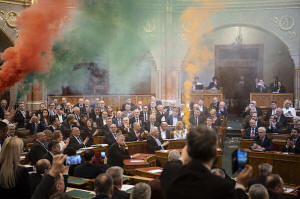Hungary's new anti-LGBTQ+ law bans Pride events and sparks protests
[March 19, 2025]
By JUSTIN SPIKE
BUDAPEST, Hungary (AP) — A new anti-LGBTQ+ law banning Pride events and
allowing authorities to use facial recognition software to identify
those attending the festivities was passed in Hungary on Tuesday,
leading to a large demonstration on the streets of Budapest.
Several thousand protesters chanting anti-government slogans gathered
after the vote outside Hungary’s parliament. They later staged a
blockade of the Margaret Bridge over the Danube, blocking traffic and
disregarding police instructions to leave the area.
The move by Hungarian lawmakers is part of a crackdown on the country's
LGBTQ+ community by the nationalist-populist party of Prime Minister
Viktor Orbán, who is an ally of Russian President Vladimir Putin and
U.S. President Donald Trump.
The measure, which is reminiscent of similar restrictions against sexual
minorities in Russia, was passed in a 136-27 vote. The law, supported by
Orbán’s Fidesz party and their minority coalition partner the Christian
Democrats, was pushed through parliament in an accelerated procedure
after being submitted on Monday.
Opposing legislators led a vivid protest in the legislature involving
rainbow-colored smoke bombs.
At the protest outside parliament, Evgeny Belyakov, a Russian citizen
who immigrated to Hungary after facing repression in Russia, said the
legislation went at the heart of people's rights to peacefully assemble.
“It's quite terrifying to be honest, because we had the same in Russia.
It was building up step by step, and I feel like this is what is going
on here,” he said. “I just only hope that there will be more resistance
like this in Hungary, because in Russia we didn’t resist on time and now
it’s too late.”

What does the law say?
The bill amends Hungary’s law on assembly to make it an offense to hold
or attend events that violate Hungary’s contentious “child protection”
legislation, which prohibits the “depiction or promotion” of
homosexuality to minors under 18.
Attending a prohibited event will carry fines up to 200,000 Hungarian
forints ($546), which the state must forward to “child protection,”
according to the text of the law. Authorities may use facial recognition
tools to identify individuals attending a prohibited event.
In a statement on Monday after lawmakers first submitted the bill,
Budapest Pride organizers said the aim of the law was to “scapegoat” the
LGBTQ+ community in order to silence voices critical of Orbán’s
government.
“This is not child protection, this is fascism,” wrote the organizers of
the event, which attracts thousands each year and celebrates the history
of the LGBTQ+ movement while asserting the equal rights of the gay,
lesbian, bisexual and transgender community.
Following the law's passage Tuesday, Budapest Pride spokesperson Jojó
Majercsik told The Associated Press that despite Orbán's yearslong
effort to stigmatize LGBTQ+ people, the organization had received an
outpouring of support since the Hungarian leader hinted in February that
his government would take steps to ban the event.
"Many, many people have been mobilized," Majercsik said. “It's a new
thing, compared to the attacks of the last years, that we've received
many messages and comments from people saying, ‘Until now I haven’t gone
to Pride, I didn't care about it, but this year I'll be there and I'll
bring my family.'”
[to top of second column]
|

MPs of Momentum protest with flares during the plenary session of
the Hungarian parliament in Budapest, Hungary, Tuesday, March 18,
2025. (Boglarka Bodnar/MTI via AP)

Government crackdown
The new legislation is the latest step against LGBTQ+ people taken
by Orbán, whose government has passed other laws that rights groups
and other European politicians have decried as repressive against
sexual minorities.
In 2022, the European Union’s executive commission filed a case with
the EU’s highest court against Hungary’s 2021 child protection law.
The European Commission argued that the law “discriminates against
people on the basis of their sexual orientation and gender
identity.”
Hungary’s “child protection” law — aside from banning the “depiction
or promotion” of homosexuality in content available to minors,
including in television, films, advertisements and literature — also
prohibits the mention of LGBTQ+ issues in school education programs,
and forbids the public depiction of “gender deviating from sex at
birth.”
Booksellers in Hungary have faced hefty fines for failing to wrap
books that contain LGBTQ+ themes in closed packaging. Critics have
argued Orbán's campaign amounts to an attempt to cut LGBTQ+
visibility, and that by tying it to child protection, it falsely
conflates homosexuality with pedophilia.
Hungary’s government argues that its policies are designed to
protect children from “sexual propaganda.”
Is Orbán trying to distract the electorate?
Hungary's methods resemble tactics by Putin, who in December 2022
expanded Russia's ban on “propaganda of nontraditional sexual
relations” from minors to adults, effectively outlawing any public
endorsement of LGBTQ+ activities.
Orbán, in power since 2010, faces an unprecedented challenge from a
rising opposition party as Hungary’s economy struggles to emerge
from an inflation and cost of living crisis and an election
approaches in 2026.
Tamás Dombos, a project coordinator at Hungarian LGBTQ+ rights group
Háttér Society, said that Orbán's assault on minorities was a tactic
to distract voters from more important issues facing the country. He
said allowing the use of facial recognition software at prohibited
demonstrations could be used against other protests the government
chooses to deem unlawful.

“It's a very common strategy of authoritarian governments not to
talk about the real issues that people are affected by: the
inflation, the economy, the terrible condition of education and
health care,” Dombos said.
Orbán, he continued, “has been here with us for 15 years lying into
people's faces, letting the country rot basically, and then coming
up with these hate campaigns.”
All contents © copyright 2025 Associated Press. All rights reserved |